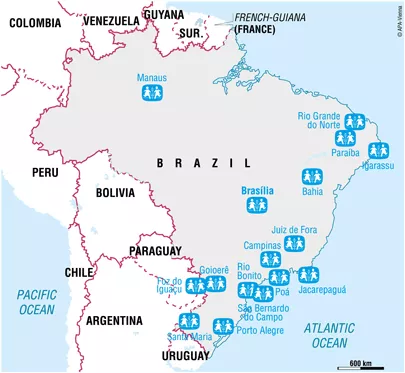
SOS relies on the kindness and generosity of Canadians to be able to provide a home for the most vulnerable children around the world.
By becoming a child sponsor you are helping an individual child in need.
(You will receive a Canadian charitable tax receipt)
Please help us ensure a loving home for every child. Sponsor a child in South America now.
SOS Children's Villages in Jacarepaguá
SOS Children’s Villages Rio de Janeiro-Jacarepaguá began its work in 1982. Today, our social centre here provides a family strengthening programme, which aims to alleviate hardship in the community in a holistic and sustainable manner. Its services include a day-care centre and childminding programme where up to 1,460 children can be cared for. This allows working parents and single mothers to leave their children in safe hands while they are out making a living.
For children from Rio who are no longer able to live with their parents, five SOS families can provide a loving home. In each family, the children live with their brothers and sisters and are affectionately cared for by their SOS mother.
When young people from the village feel ready to move out of the family home in order to pursue further education or vocational training, the SOS Youth Programme makes shared accommodation available to them. With the support of qualified counsellors, the young people live together and learn to take responsibility, plan their future and prepare for independent adult life.

Government social programmes have achieved great improvement, but much work remains to be done
Rio de Janeiro, capital of the state of the same name, has a population of approximately 6.3 million and is located in southern Brazil. It is a popular tourist destination and its famous Copacabana beach and carnival attract thousands of visitors from around the globe every year. It was the capital of Brazil until 1960.
Despite gradually improving living conditions in other parts of the country, many internal migrants continue to come to Rio in search of opportunity. This has led to overpopulation and the creation of so-called “favelas”, the shanty towns that sprawl across the hills surrounding Rio. Living conditions here are often precarious, despite government efforts to improve people’s situation. Child labour, malnutrition and dropping out of school are common among children from these areas.
In one of the world’s most unequal societies, children from all backgrounds deserve a chance
In recent decades, Rio has seen an increase in organised crime, drug trafficking and violence: in 2008, for example, over 50,000 people were murdered in Brazil. In preparation for the 2014 FIFA World Cup and the 2016 Summer Olympics, efforts to control violence have increased, with police regaining control over neighbourhoods previously run by gangs. These initiatives have indeed yielded results, but the murder rate remains very high, and the proportion affecting 15-24 year olds has even increased.
In a country without a civil war or any other immediately apparent reason for such violence, the causes must be sought elsewhere: Brazil remains a deeply unequal society, with the wealthiest ten per cent of Brazilians receiving 42.7 per cent of the nation's income, while the poorest ten per cent receive a share of less than 1.2 per cent. Some even go so far as to call this “social apartheid”, with the middle classes shielding themselves from the poor with gates, walls and private schools for their children.
Our Impact
Image

SOS Social Centres in Brazil aim is to help families, in particular women and children, living in communities neighbouring the SOS Children's Villages to gradually escape from poverty, and to help young people become self-reliant. |
2 SOCIAL CENTRES | 512 Beneficiaries |
Image
The SOS Children's Village in Brazil provides loving homes to orphaned and abandoned children |
1 VILLAGES | 26 Orphaned and Abandoned Children |
Our Impact

